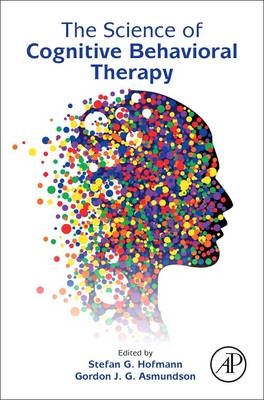
The Science of Cognitive Behavioral Therapy
Academic Press Inc (Verlag)
978-0-12-803457-6 (ISBN)
The overarching principle of CBT interventions is that cognitions causally influence emotional experiences and behaviors. The book reviews recent mediation studies, experimental studies, and neuroimaging studies in affective neuroscience that support the basic model of CBT, as well as those that clarify the mechanisms of treatment change.
Additionally, the book explains the interplay of cognition and emotion in CBT, specifies the treatment goals of CBT, discusses the relationship of cognitive models with medical models and associated diagnostic systems, and provides concrete illustrations of important general and disorder-specific considerations of CBT.
Stefan G. Hofmann is a Professor of Psychology and Director of the Psychotherapy and Emotion Research Laboratory at Boston University. Dr. Hofmann has served as President of the Association for Behavioral and Cognitive Therapies and the International Association for Cognitive Psychotherapy. His research focuses on the mechanism of treatment change, translating discoveries from neuroscience into clinical applications, emotions, and cultural expressions of psychopathology. Gordon J. G. Asmundson, Ph.D. is an international expert on psychopathology and its overlap with chronic health conditions. He is a Registered Doctoral Psychologist and Professor of Psychology at the University of Regina. He was born in Zweibrucken Germany on a Canadian Air Force Base and was raised in Canada where he received his BA, MA, and doctorate in Psychology from the University of Manitoba. In 2005-2006 he trained as a Beck Scholar at the Beck Institute for Cognitive Therapy and Research in Philadelphia. He holds several editorial posts, including Editor-in-Chief of the Journal of Anxiety Disorders and of Clinical Psychology Review, and serves on the editorial boards for nine other journals. His research and clinical interests are in assessment and basic mechanisms of fear, the anxiety and related disorders, and chronic pain, and the association of these with each other, maladaptive coping, and disability. His pioneering work on fear and avoidance in chronic pain and his shared vulnerability model of co-occurring PTSD and chronic pain have led to significant advances in understanding and treating these prevalent, disabling, and costly conditions. His empirical work on PTSD and other anxiety-related conditions has also influenced changes in the most recent edition of the Diagnostic and Statistical Manual of Mental Disorders. Dr. Asmundson has published over 380 peer-reviewed journal articles, 70 book chapters, and 8 books. He is a Fellow of the Association for Behavioral and Cognitive Therapies and of the Canadian Psychological Association. In addition to numerous prestigious awards received over the course of his career, in 2009 Dr. Asmundson received the highest accolade available to scientists and scholars in Canada – induction as a Fellow of the Royal Society of Canada – and in 2014 received the Canadian Psychological Association Donald O. Hebb Award for outstanding contributions to the science of psychology. Dr. Asmundson is married and has two children.
1. The Generic Model of Cognitive Behavioral Therapy: A Case Conceptualization-Driven Approach 2. Treatment-Relevant Assessment in Cognitive-Behavioral Therapy 3. Learning Principles in CBT 4. Cognitive Processes in CBT 5. Emotion Regulation in Cognitive Behavioral Therapy: Bridging the Gap Between Treatment Studies and Laboratory Experiments 6. Combined Treatment with CBT and Psychopharmacology 7. Acceptance and Commitment Therapy and the Cognitive Behavioral Tradition: Assumptions, Model, Methods, and Outcomes 8. Mindfulness-Based Cognitive Behavioral Treatments 9. Global to local: Adapting CBT for Cross-Cultural Expressions of Psychopathology 10. Cognitive-Behavioral Therapy in Older Adults 11. Cognitive-Behavioral Therapy for Children and Adolescents 12. Behavioral Activation Treatments for Depression 13. Posttraumatic Stress Disorder 14. Eating Disorders: Transdiagnostic Theory and Treatment 15. Transdiagnostic Treatment for Anxiety Disorders 16. Cognitive Behavioral Therapy for Sleep Disorders 17. Cognitive Behavioral Therapy for Somatoform Disorders and Pain 18. Dialectical Behavior Therapy: Overview, Characteristics, and Future Directions 19. Cognitive Bias Modification 20. Cognitive Training in Schizophrenia 21. Internet-Based Cognitive Behavior Therapy 22. Virtual Reality and Other Realities
| Erscheinungsdatum | 10.06.2017 |
|---|---|
| Verlagsort | San Diego |
| Sprache | englisch |
| Maße | 152 x 229 mm |
| Gewicht | 1160 g |
| Themenwelt | Geisteswissenschaften ► Psychologie ► Allgemeine Psychologie |
| Geisteswissenschaften ► Psychologie ► Verhaltenstherapie | |
| Medizin / Pharmazie ► Medizinische Fachgebiete ► Psychiatrie / Psychotherapie | |
| ISBN-10 | 0-12-803457-2 / 0128034572 |
| ISBN-13 | 978-0-12-803457-6 / 9780128034576 |
| Zustand | Neuware |
| Haben Sie eine Frage zum Produkt? |
aus dem Bereich


